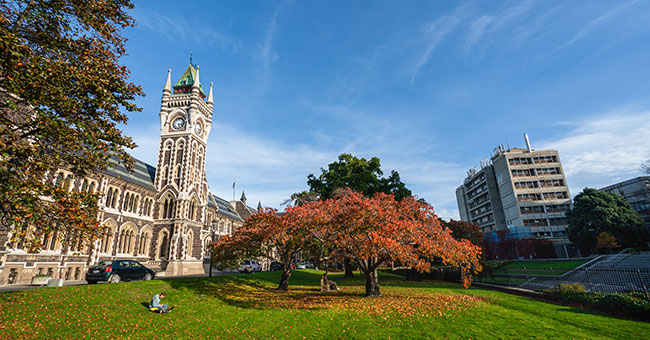
Working Group Report Accepted
The University of Otago – Ōtākou Whakaihu Waka Council has accepted the recommendations of the Working Group on Institutional Neutrality to adopt a statement on institutional neutrality, and to develop ethical investment and ethical procurement policies.
The recommendations were endorsed by the University’s leading academic body, the Senate and the University Council at recent meetings. The working group was chaired by Emeritus Professor James Maclaurin and included staff and student representation. They undertook consultation across the University, including in-person submissions from staff and students.
Vice-Chancellor Grant Robertson says the working group thoroughly tested the question of whether the University should re-affirm its historic stance that it does not take positions on political matters that are not related to the roles and functions of the University.
Vice-Chancellor Grant Robertson
“After its extensive process, the working group concluded that this position should continue but be backed up by a statement to provide the full context for such a stance.
“Our University upholds free speech and academic freedom as essential values. By not taking a University wide position on political issues not related to our core roles and functions, we ensure that our community can freely explore, discuss and engage with critical issues,” Mr Robertson explains.
“If the University were to take a stance on political issues not connected to our roles and functions, this would place those members of the community who hold a different view in a difficult position and potentially have a chilling effect on them and their work.
“As one senior academic said during discussions – ‘the University is neutral, so that we do not have to be’.”
The restrictions on taking political positions only apply to those who act as managers and does not cover scholarly or scientific work or statements made outside of work.
The statement also makes clear what the University considers to be its roles and functions. These include the safety and wellbeing of staff and students, financial and regulatory concerns, sustainability, equity, ethical investment and obligations under Te Tiriti o Waitangi, as mandated in legislation.
“These are matters that the University should properly be advocating and commenting on. The core strategy and framework documents of the University outline the goals and actions that the University will take in these areas, and they are not subject to the institutional neutrality statement,” Mr Robertson says.
The working group’s recommendation that the University develop ethical investment and procurement policies has also been accepted, and Mr Robertson says this builds on work that has already begun. The policies will be developed in line with the University’s values and strategic frameworks.
“This was a strong message from the consultation process, that staff and students want to see. It is important that how we invest and purchase goods is not only achieving good financial outcomes, but also ones that uphold the University’s values.”
Mr Robertson says all students and staff are supported to hold their views and express them in a way that is peaceful, respectful and upholds the values of the University.
“In the face of many things happening in the world today, it is understandable that there are very strong views on political issues held by many people on campus. I have strong personal views as well. The University not taking a single position on them is not indifference, but rather it is our job to make sure that the right for people to peacefully express their views upheld.”
The new policy also follows closely on the heels of the University adopting a statement on Free Speech last year, reaffirming the University as a place where people can have confidence about engaging with one another as a diverse community with diverse ideas.
The Government has introduced legislation that will require all universities to adopt freedom of expression statements.
“Otago’s work pre-dates the release of this legislation, but it is our judgement that a combination of the free speech policy and this statement will fulfil the requirements of the legislation,” Mr Robertson says.
The University of Otago – Ōtākou Whakaihu Waka adopts a position of institutional neutrality. This means that University leaders will not communicate institutional positions on controversial political topics except where such issues directly impact the University’s role or functions. Examples of such functions are the safety and wellbeing of staff and students, financial and regulatory concerns, sustainability, equity, ethical investment, and obligations under Te Tiriti o Waitangi. The University’s strategic documents and frameworks* are directly related to the role and functions of the university and therefore are not captured by the definition of institutional neutrality.
The University commits to creating, advancing, preserving, and applying knowledge, to partnering with mana whenua, and to upholding Te Tiriti o Waitangi. It does so as a community prepared to challenge social values, policies, practices, and institutions. On issues that directly impact the University’s role and functions, the University will communicate its ethical commitments and actions in support of those commitments acknowledging, where appropriate, disagreement within the University community as well as ongoing academic debate.
In the context of this policy, University leaders are any managers of units within the University. Communication here excludes scholarly or scientific communication as well as communications outside of work. Our University champions free speech and academic freedom. Its institutional neutrality upholds the principle that the University best serves society by allowing its members the maximal freedom to investigate, debate, and speak on important matters.
* As of 2025 these are: Pae Tata | Strategic Plan to 2030, the Māori Strategic Framework 2030, the Pacific Strategic Framework 2022–2030, the Equity and Diversity Strategic Framework, and Tī Kōuka: The Sustainability Strategic Framework 2022–2030.
https://www.otago.ac.nz/news/newsroom/working-group-report-accepted


